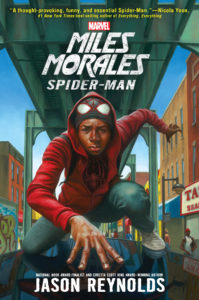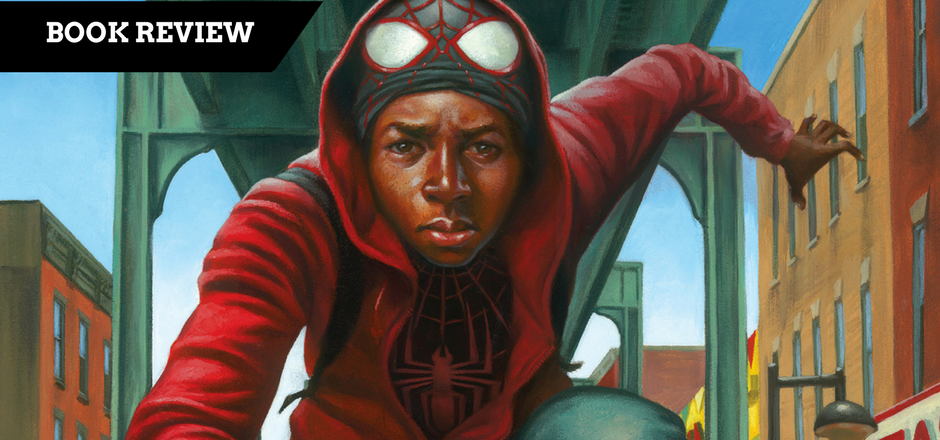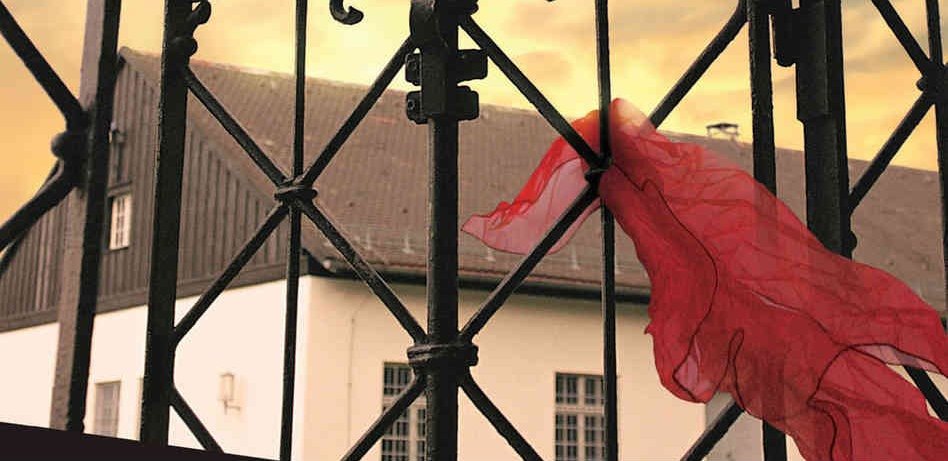Miles Morales is sixteen years old, the same age his dad was when he and Uncle Aaron started going in and out of the system — and even though Miles spends his spare time (and even some of his not-so-spare time) as Spider-Man, he’s starting to worry that his dad’s past is an indicator of his own future. As he inches closer to losing his scholarship at a prestigious Brooklyn boarding school, Miles struggles to identify what his Spidey senses are trying to tell him while he struggles to keep his head above the water.
While Marvel’s done a pretty good job with some of its previous superhero novelizations — I’m a particular fan of The She-Hulk Diaries — Miles is a different sort of hero than previous novelizations have starred. Originally introduced in 2011 as part of the Ultimate Fallout comics, Miles is generations younger than original Spider-Man Peter Parker (1962), Natasha Romanoff (1964), Jennifer Walters as She-Hulk (1980), and X-Men’s Rogue (1981).
Miles is much more at home with the new generation of Marvel heroes who converge in the ongoing Champions series, a team that includes Kamala Khan and Amadeus Cho — a team of young heroes created in a time and place that looks a lot more like the one with live in now.
 Although I was initially surprised to hear about the Miles Morales novel — I found out about it only a couple months before its release — I wasn’t surprised in the least to see Jason Reynolds attached to the project. Reynolds is an award-winning children’s author, and he’s pretty well-known for writing about boys who live in Brooklyn.
Although I was initially surprised to hear about the Miles Morales novel — I found out about it only a couple months before its release — I wasn’t surprised in the least to see Jason Reynolds attached to the project. Reynolds is an award-winning children’s author, and he’s pretty well-known for writing about boys who live in Brooklyn.
In other words, boys like Miles Morales.
At 16, Miles is concerned he’s destined to follow the same path as his father and his uncle, who both went in and out of jail as teens for petty crimes and more. His Spidey senses keep going haywire at the worst time: in the middle of history class, taught by a “subtly” racist teacher named Mr. Chamberlain who seems to have it out for Miles. And every mistake he makes at Brooklyn Visions Academy puts his scholarship — and his future — in peril.
Miles’ struggle in this story isn’t an exclusively superhuman one, and the fight against the Big Bad isn’t even one he truly needs superpowers to fight. (Although his superpowers definitely help. A lot.) His journey is an incredibly personal one: trying to figure out whether he deserves to be Spider-Man or if he’ll never be anything more than a criminal, which is how many of the school’s administrators treat him.
Reynolds’ version of Miles Morales is the realest superhero I’ve ever had the privilege of reading. As someone who attended a private school as a child — which my parents could only afford with financial assistance and volunteering — I understood every moment Miles felt that he didn’t belong with the wealthier, much more advantaged kids at Brooklyn Visions Academy. In one of my favorite moments, he rolls his eyes on the subway as tourists gape over “showtime.”
(I don’t live in New York, but the exact same thing happened at least once a week on my Philly subway commute.)
But most of all, Chamberlain’s treatment of Miles — especially how he chooses to humiliate Miles in front of the rest of his class — felt the most real to me. I’ve had a Chamberlain of my own: a substitute teacher in junior high who always ignored the one black boy in our class when he raised his hand. But in my class, other students stuck up for our classmate in one mass, and Miles doesn’t have that privilege.
The book isn’t very action-driven until the end, when Miles faces off against the Big Bad, but the book doesn’t suffer from that at all. As a reader who’s never picked up a Miles Morales comic, I had no problems understanding what was happening in the story, and it was fun getting to know Miles and his family.
While I’m sure the character of Miles Morales doesn’t fit with all readers’ image of an escapist non-political superhero, reading Jason Reynolds’ interpretation of his story is one way that readers far removed from a black boy’s view of gentrifying Brooklyn can understand what contemporary racism looks like. This is a must-read for teachers who work with middle grade and high school boys, and it’s a fantastic read for reluctant city school readers.
5 out of 5 stars
This review contains affiliate links. While Girls in Capes does make revenue from purchases made at affiliate links, reviews are not paid, and all reviews contain the staff writers’ honest opinions of the work.
Want to read more about Miles? We want to introduce you to Miles Morales in Ultimate Comics — and we can tell you about how fans have reacted to him and Kamala Khan.





